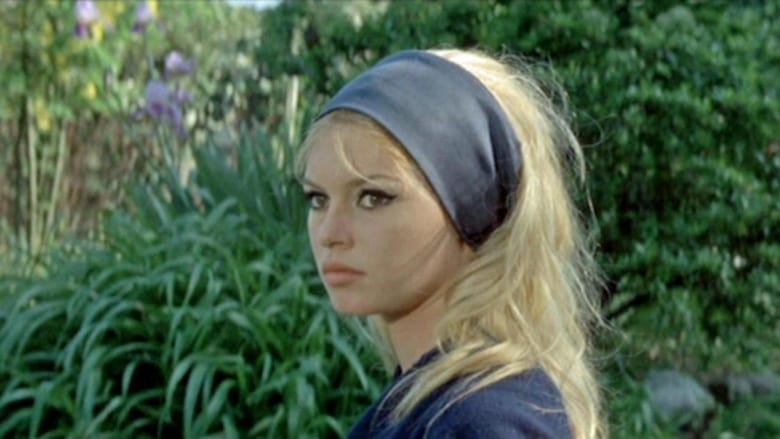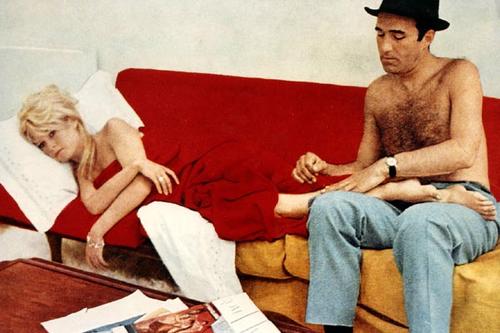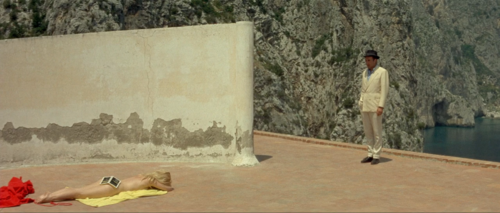← Back to Reviews

in
My reviews are going to be a little more random in the future. I'll just write a little bit about some films if I feel like it or if the movie is worth it. The length will also vary. Some posts will contain a bunch of short reviews and others will be longer reviews about one or two films. I decided to write a medium-sized one about this film:
Le Mépris (1963)



This was my first Godard film and I must say I really enjoyed it. I'm glad that I'm not disappointed with my first 'exploration' of one of the most famous and praised French directors of all time.
Visually, this film is absolutely amazing. The fresh camera work, the wonderful use of colors, the stylishness of the clothing and the environments, the charming locations and of course the incredible beauty of Brigitte Bardot make this film a real treat for the eyes.
Story-wise, I especially liked the structure and the many different layers of what's happening. There is the film-within-the-film that is based on Homer's Odyssey, the modernly twisted similarities of that story with the relationship that is presented to us and the theme of the filmmaking progress.
Purely as an intimate story about the wrecking of a marriage, I found it to be quite frustrating sometimes, because the two main characters wouldn't truly communicate with eachother. They were constantly playing games and therefore they never reached the core of their problem.
Personally, I liked the hotel sequence in Before Midnight (for example) better content- or dialogue-wise than the apartment sequence in this film (although it is artistically much more complicated and fascinating in Le Mépris), because in that film the characters were actually graving deeper and deeper into their problems, while in this movie they merely scratched the surface at the end. The relationship between the two main characters came over to me as extremely fragile.
As a defence for this movie's relationship aspect, though, I want to go back to what I praised earlier, which is the whole structure of this film. Godard uses several 'in the face' jump cut sequences and lets us see everything dissolve slowly at the same time to show us the deeper meanings of the problems that are occurring. It was the cruelness of fate (Neptune?), the agressive womanizing style of the producer and the carelessness of Paul that made the whole situation blow up. We don't particularly get intimacy, but what we do get is deeper explanations. He brought all the different interesting elements of the tragedy together in a very sagacious manner and, in the end, he created a dramatic and poetic piece of art.
A wonderful introduction to Jean-Luc Godard.
+

Le Mépris (1963)



This was my first Godard film and I must say I really enjoyed it. I'm glad that I'm not disappointed with my first 'exploration' of one of the most famous and praised French directors of all time.
Visually, this film is absolutely amazing. The fresh camera work, the wonderful use of colors, the stylishness of the clothing and the environments, the charming locations and of course the incredible beauty of Brigitte Bardot make this film a real treat for the eyes.
Story-wise, I especially liked the structure and the many different layers of what's happening. There is the film-within-the-film that is based on Homer's Odyssey, the modernly twisted similarities of that story with the relationship that is presented to us and the theme of the filmmaking progress.
Purely as an intimate story about the wrecking of a marriage, I found it to be quite frustrating sometimes, because the two main characters wouldn't truly communicate with eachother. They were constantly playing games and therefore they never reached the core of their problem.
Personally, I liked the hotel sequence in Before Midnight (for example) better content- or dialogue-wise than the apartment sequence in this film (although it is artistically much more complicated and fascinating in Le Mépris), because in that film the characters were actually graving deeper and deeper into their problems, while in this movie they merely scratched the surface at the end. The relationship between the two main characters came over to me as extremely fragile.
As a defence for this movie's relationship aspect, though, I want to go back to what I praised earlier, which is the whole structure of this film. Godard uses several 'in the face' jump cut sequences and lets us see everything dissolve slowly at the same time to show us the deeper meanings of the problems that are occurring. It was the cruelness of fate (Neptune?), the agressive womanizing style of the producer and the carelessness of Paul that made the whole situation blow up. We don't particularly get intimacy, but what we do get is deeper explanations. He brought all the different interesting elements of the tragedy together in a very sagacious manner and, in the end, he created a dramatic and poetic piece of art.
A wonderful introduction to Jean-Luc Godard.
+

